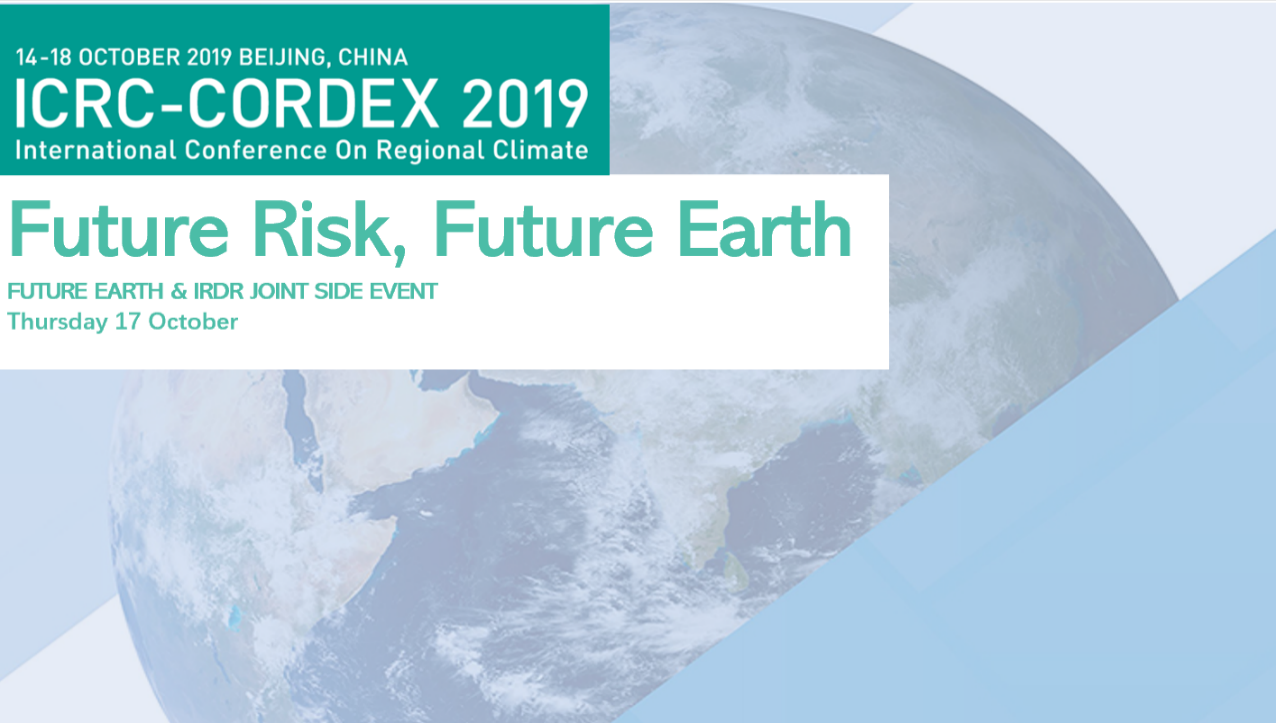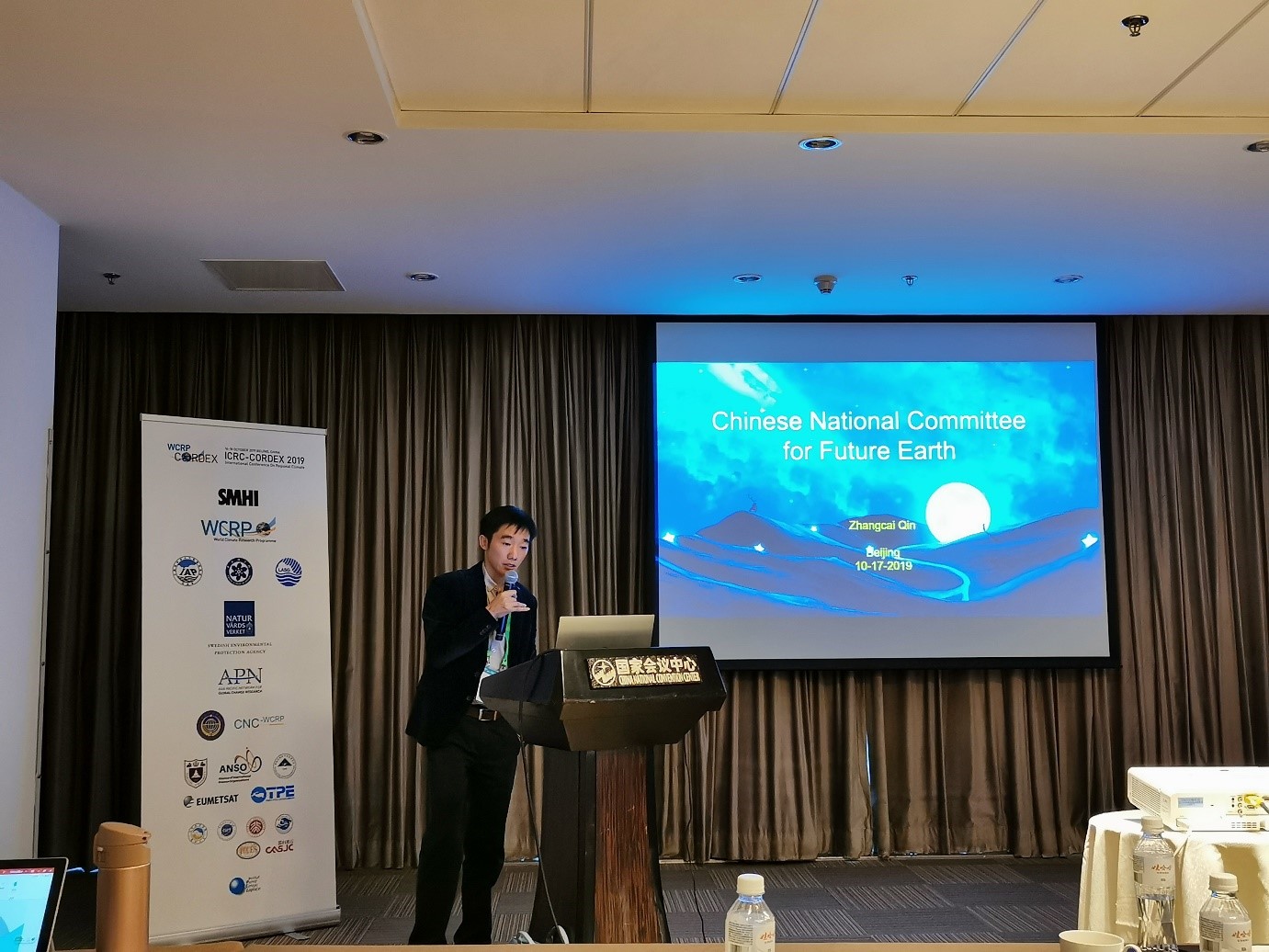
A side event of ICRC-CORDEX 2019 themed on Future Risk, Future Earth was held on Thursday 17 October.
Extreme climate and weather events, associated disasters, and emergent risks are becoming increasingly critical in the context of global environmental change. They are a potential major threat to reaching United Nations’ Sustainable Development Goals (SDGs) and one of the most pressing challenges for future human well-being. The global risks are increasingly complex, uncertain, systemic, and dynamic. To tackle them effectively we will need strong, transdisciplinary understanding and action globally.
Future Earth community — Integrated Risk Governance Project (IRG), Monsoon Asia Integrated Research for Sustainability (MAIRS), Chinese National Committee for Future Earth(FE-CNC) in collaboration with World Climate Research Programme (WCRP) and Integrated Research on Disaster Risk (IRDR) jointly organized a side event of ICERC-CORDEX 2019 themed Future Risk, Future Earth.
The main objectives of this side event was to 1) present the latest achievements and research progress on climate change related risk, disaster, and the human-natural components interactions at regional-to-global levels, 2) address the climate related risk and disaster challenges in regional sustainability, and 3) provide an opportunity for face-to-face dialogue between social and physical communities of regional sustainability research.
Representatives from IRG Project, MAIRS, FE-CNC and IRDR presented their past work and discussed the future cooperative workplans with participants. Dr. Qian Ye, Director of IRG International Project Office chaired the session and gave a speech on Understanding Risks: From Future Earth to Future World. He highlighted that understanding the mechanism of systemic risk is the core scientific issue as the world is now living in a new and uncertain era with rapid growth of population, economic change, urbanization and technology development. To better tackle global systemic risks, a multi-institutional, interdisciplinary community of scientists, policy makers and other stakeholders need to conduct and apply research dealing with a high degree of complex and inter-connected disaster chains.
Dr. Wei Wan, the Executive Director of MAIRS International Project Office shared that monsoon Asia region is affected by a range of natural disasters, most of which are exacerbated by climate change. Billions of people in the region were affected by disasters such as floods and drought. Dr. Wan stressed that the challenges facing humanity today are too big for any one research group to solve on its own, thus collaboration and exchange sit at the heart of global research programs.
Dr. Zhangcai Qin from Sun Yat-sen University gave an introduction on the Chinese National Committee for Future Earth, which was established to guide and organize Chinese research communities and stakeholders to enable their contribution to the Future Earth. FE-CNC provides scientific support and policy consultation according to national and local government needs through research work conducted by committee members and experts.

Dr. Qin, Presented the Chinese National Committee for Future Earth
Ms. Fang Lian, the Science Officer of IRDR comprehensively introduced the progress and outputs of IRDR and the future research agenda of disaster risk reduction. IRDR announced the co-organizing of a high-level science conference in 2020 with The United Nations Office for Disaster Risk Reduction (UNDRR) and its branches, International Science Council and its Interdisciplinary Body to discuss the new research agenda, new partnerships and new capacity for the scientific community and its mission.
Dr. Koji Dairaku from the University of Tsukuba and Dr. Claas Teichmann from the Climate Service Center Germany representing CORDEX Asia and EURO_CORDEX communities, Dr. Fredolin Tangang from the National University of Malaysia representing both CORDEX South East Asia and MAIRS-FE SSC as well as Dr. Juan Pedro Montávez from University of Murcia joined the speakers for the panel discussion. How to transfer the research results to policy became primary challenge to be tackled for the community. Consensus was reached during the discussion that the academic community should engage more effectively with policy-makers, and decision-makers in the public and private sectors through the co-design, co-production and co-deliver principles.
This side event provided an open platform for scientific communities from across science disciplines on extreme events, disaster risk reduction and governance to exchange information, knowledge and explore potential opportunities in collaborative research activities.
Learn More from the Event Website:
http://icrc-cordex2019.cordex.org/program/side-event-future-risk-future-earth/
